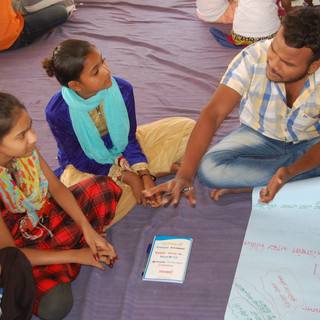Youth empowerment
- Snehalaya

- Mar 15, 2018
- 4 min read
Snehalaya’s Yuva Nirman project works with youth volunteers to introduce them to social work. As part of their activities they conduct two youth camps each year. We launched our Educate. Empower. Lead. campaign with Malala Fund at our August 2017 camp and our January 2018 camp was fully dedicated to the campaign.
Our campaign was inaugurated by Mr Ranjankumar Sharma Superintendent of Police, Ahmednagar who also signed our pledge offering his support for the campaign. We also conducted a signature campaign asking the 219 delegate and guests to pledge support for the campaign. Signees included the District Collector, Abhay Mahajan, and all of the youth volunteers made a pledge to support girls’ education and 161 of them signed up to volunteer with us to help run our outreach workshops in their own slum, Dalit, red light and Muslim communities.

80 delegates attended our 3-day January Youth Camp dedicated to our Educate. Empower. Lead. Campaign. They were joined by 14 peer mentors to discuss and decide how they would improve education for girls.
Guest speakers were Dr Seema Chavan, Assistant Professor at RBNB College and advisor to the Open University, Srirampur, and Shyam Asawa, Anna Hazare’s advocate. Our own field and management staff also presented as part of the camp program discussing the work we do to reduce the CSEC and women through our 19 projects. These really brought to life the realities for women and children, the risks, the laws that protect them and the importance of education in rehabilitation and prevention of exploitation and second-generation prostitution. These were complemented by talks from our sex worker peer educators and our peer mentors living in our shelter homes and slums.
This was a great opportunity for our peer mentor beneficiaries who hadn’t been exposed to our work in other projects as well as the camp participants to hear and question first-hand people who work in the field handing the cases that this campaign is seeking to prevent. The heads of our vocational training centers were also able to promote their work.
Group activities tasked the attendees with discussing what they could do practically to improve the situation of girls’ education once the camp was over. Each group was joined by at least one peer mentor to advise them from the perspective of the target group and the ensuing debates and commitments were energetic and fruitful. This was a great opportunity to hear from young people, including our peer mentors, on their views and suggestions to improve their situation and prevent CSEC and all 80 participants were eager to sign up as campaign volunteers to keep the momentum going. We are now developing a volunteer toolkit to distribute to the attendees to inspire and encourage them to deliver their own activities to spread the campaign further.
The following reports of the first two days of the camp were written by one of our peer mentors, Puja, who also took responsibility for helping manage the accommodation for campers before attending the full three days of the camp. She says: “Attending the camp and interacting with the youths and peer mentors was very enjoyable. As well as speaking myself I enjoyed the talks from all the speakers and joining in with the group activities and I really feel like the youths were interested in what I had to say and working to help improve equality in education.”
26 January 2018
The Malala campaign was explained to the audience describing how the Snehalaya Malala team is made up of staff and girls aged between 13 and 17, the target age for the campaign on equality in education.
One of the peer mentors from our Balbhavan projects then spoke about who Malala Yousafzai is and why she has become an advocate promoting girls’ education across the world. Other peer mentors joined the discussion to share what they have learned through the campaign so far and what messages we should be sharing with the next generation to improve education for all. The assembled campers were given a brief on what they would be learning during the camp and asked to think about what they could do to help the campaign and promote girls’ education in their own homes and communities.
This was followed by a talk from Prachi, Project Manager for our Childline project which operates the 24-hour helpline, 1098. She explained the role of Childline and their work which to date has handled over 10,000 cases of children in conflict with the law and in need of care and protection expanding on how they receive and solve the cases.
Next was Shilpa, Project Manager for our Snehadhar (women’s shelter) project which works for and with women over 18. Over the eight years they have been in operation the majority of their cases involve sex workers, widows and sexual assault and eve teasing victims of molestations.
Through these presentations the campers were able to gain real-life insights into the issues that result when a girl is denied education and were motivated to help in our campaign.
27 January 2018
Jayatai Jogdan, peer educator in our sex work projects and also for our Malala campaign was invited to speak to the Youth Camp. She introduced herself and her role as a peer educator employed by Snehalaya to promote our services and to support sex workers living in Shevgoan red light area. One of her initiatives has been to establish three self-help groups in the community which among other activities provide medicines to people, mainly girls, who are HIV positive and living in slum areas.

Through this, Jayatai and the self-help groups save around 10,000 people per month from HIV/AIDS.
Jayatai explained that as she and the members of the groups are all uneducated she has many obstacles to face in conducting her work. Speaking from her own experience of a lack of formal education she stressed the importance of ensuring girls are given the opportunity for an education that she missed out on to avoid ending up like her.
Despite being illiterate, Jayatai is a fantastic asset to Snehalaya having represented us at an international conference of sex workers in Mexico and also serving as a trustee on our organisation’s Board. She is justifiably proud of her accomplishments but as she says, imagine what she could do if she had received a formal education and was literate.





































